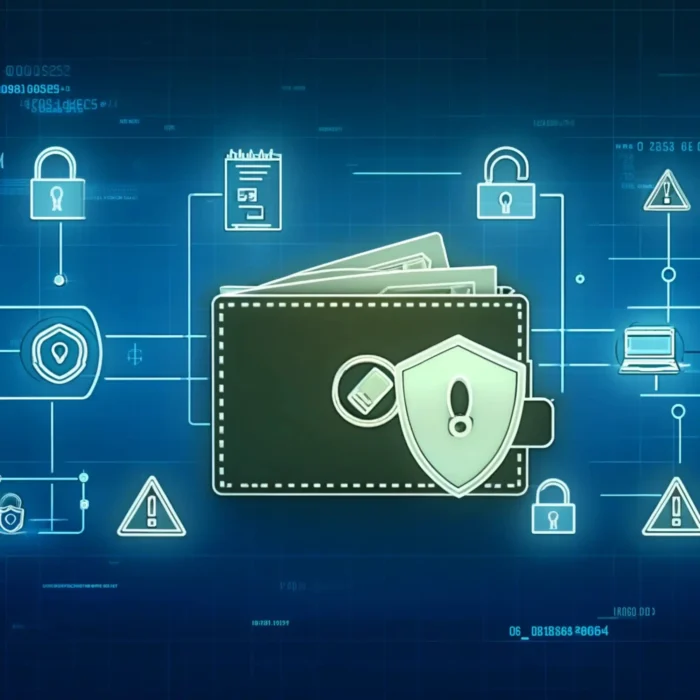Get Scam Alerts & The Latest Crypto News:
As the rising sun paints the sky with streaks of vibrant hues, birds flutter to begin another day, wrapped in nature’s serenade. In the digital universe, it’s similar, but with a twist – with every dawn, new packets of cryptocurrencies are mined, marking the start of another volatile day in the digital economy. However, lurking in the shadows, the cyber scavengers, hackers notorious for their ruthless skill of infiltrating security systems, are always on the prowl, eager to snatch these precious digital nuggets. But fear not, intrepid crypto enthusiasts. Like a reliable old compass guiding a bold explorer through treacherous territories, this ‘Due Diligence Guide’ is here to illuminate your pathway and guard your digital treasures. Let us embark on this journey to understanding how to protect your cryptocurrencies from the fangs of these digital predators.
Understanding the Importance of Crypto Security
With cryptocurrency becoming increasingly popular, it has unfortunately also become a prime target for cybercriminals. Apart from the financial implications and stress, falling victim to a crypto hack will also erode your confidence in the whole ecosystem. Therefore, understanding the importance of crypto security and knowing how to protect your hard-earned digital assets is critical.
One of the first areas to focus on is protecting your private keys. Remember that losing your private key is equivalent to losing your crypto. Store offline copies of your private keys in secure locations, and consider investing in hardware wallets. These devices manage your keys offline, providing an added layer of security against online attacks. Furthermore, be vigilant of phishing attempts that try to trick you into revealing your private information. Always double-check the source of an email or message before opening it or clicking on any embedded links.
Another significant area of concern is the exchange where you trade and store your crypto. While most people love the convenience and features offered by exchanges, not all are created equally when it comes to security. Consider the following points when choosing an exchange:
| Exchange Security Features |
|---|
| Two-factor Authentication (2FA) |
| Cold Storage Policies |
| Insurance Cover for Assets |
| Security Track Record |
| Data Encryption |
Keep your software up-to-date. Whether it is your wallet software or the operating system on your device, make sure they are always updated. Not doing so may leave your system vulnerable to known security issues. Simply put, crypto security starts with you, so be diligent and stay vigilant!
Implementing Secure Wallet Practices for Your Cryptocurrency
As cryptocurrencies continue to rise in popularity, so too does the specter of potential hacks. Transactions carried out in this digital realm are often glorified for their security, yet transgressions can occur if you don’t put solid protective measures in place. This begs the question: how to do you shield your crypto assets from prying hackers? One effective stratagem is equipping yourself with secure wallet practices.
A secure wallet begins with a credible wallet provider. While the internet brims with numerous crypto wallet options, not every wallet can withstand the might of hacking attempts. A great rule of thumb is to stick to reputable providers that prioritize security in their service delivery. This may mean shelling out a few more dollars than anticipated but remember, the cost of a hack is usually much higher.
Additionally, it’s beneficial to implement multi-factor authorization (MFA) for your wallet. MFA presents an extra line of defense against unauthorized entries. Not only will you need your regular login details, but also a unique code that’s typically sent to your smartphone.
Here is a simple guide to implementing secure wallet practices:
- Selection of Wallet: Settle for a provider known for prioritizing user security. Research, read reviews, and ask around.
- Secure Your Devices: Ensure your devices (PC, smartphone) are safeguarded against viruses and malicious software.
- Use Multiple Signatures: Activate this option to require more than one private key to make a transaction.
- Backup: Frequently back up your wallet to protect against technical glitches, loss, or damage of devices.
Your mission to protect your wallet shouldn’t end at practicing secure wallet ethics. You must keep abreast of the latest trends and potential loopholes in crypto security. As with the security in any field, burdensome though they may seem, these moves are necessary to ensure your cryptocurrency remains in your hands and no one else’s.
Exploring the Role of Private Keys in Crypto Protection
Private keys play a crucial role in protecting your digital assets. Think of these keys as your secret password or digital signature, which controls access to your cryptocurrency holdings. When mapped with the corresponding public key, it forms a secure digital identity reference based on possession. Cryptocurrency stored online is susceptible to theft, and therefore, keeping your private keys secure is paramount.
To ensure the utmost encryption, most blockchain ecosystems adopt the Elliptic Curve Digital Signature Algorithm (ECDSA). It’s a sophisticated algorithm that provides enhanced security by generating unique private and public keys for each transaction. This private-public key pair is what creates a digital signature, ensuring non-repudiation, integrity, and authenticity of the exchanged data. Remember that the strength of your security is directly proportional to the randomness of your private key.
Never disclose your private keys to anyone. Once lost, they are virtually irreplaceable. Simultaneously, if it falls into the wrong hands, it can lead to theft of your digital assets. Hence it’s crucial to store your private keys in a secure and offline environment, far away from the eyes of malicious players.
However, managing private keys manually can be quite cumbersome. Thankfully, there are automated solutions – often referred to as wallets – designed to securely generate, store, and manage these cryptographic keys. Wallets are typically encrypted with a PIN or password, ensuring a second layer of security.
| Top 3 Wallets for Crypto Protection | Features |
|---|---|
| Hardware Wallet | Stores your private keys offline on a physical device, often requiring a PIN for extra security. |
| Mobile Wallet | These mobile applications offer convenience but should be used with caution due to potential security vulnerabilities in mobile platforms. |
| Desktop Wallet | Installed on a PC or laptop. Desktop wallets provide good security unless your computer is compromised. |
In essence, owning the private key gives you control over your cryptocurrency. Invest time in learning how to securely protect and manage your private key. If you own substantial quantities of cryptocurrency, it might be worth considering professional custodian services for added protection.
Choosing the Right Crypto Exchange: Security Considerations
In your journey through the crypto-world, the first major decision you’ll make is the choice of a cryptocurrency exchange platform. In making this selection, security should be your top consideration. Over $1.8 billion was stolen from crypto exchanges in 2021, according to CipherTrace. It is, therefore, imperative to pick an exchange that follows stringent security protocols.
The first thing to look out for is two-factor authentication (2FA). This additional security layer goes a long way in preventing unauthorized access to your account. The process involves verifying your identity using two different methods – like something you know (i.e., password) and something you have (i.e., verification code sent to your device). Most crypto exchanges offer this feature, and it is highly recommended to use it.
Don’t let your guard down when it comes to safeguarding your cryptocurrencies. The most secure exchange platforms have transparent security measures for their customers.
Another vital security feature is a multi-signature requirement, especially for withdrawals. Here, multiple approvals are required for a transaction to proceed. This feature significantly decreases the chances of a single point of attack. Always prefer exchanges that use encrypted emails for communication.
| Security Feature | Description |
|---|---|
| Two-Factor Authentication (2FA) | Verification of your identity using two different methods. |
| Multi-Signature Requirement | Requires multiple approvals for a transaction to proceed. |
| Encrypted Emails | Ensures confidential communication between you and the exchange. |
it’s crucial to verify that the platform you are about to invest in has an insurance fund. This fund usually covers users’ losses in the event of a hack or system failure. Note also that reputable exchanges will have external audit reports made about them and their activity; these serve as an additional layer of reassurance. Remember that the responsibility for your cryptocurrency security is, ultimately, in your hands.
Crafting Robust Passwords and Two-Factor Authentication for Crypto Safety
As the world becomes more digitalized, the need for effective and efficient cybersecurity measures is greater than ever. Whether you are an individual or a business, a robust password is your first line of defense when it comes to preventing unauthorized access to your cryptocurrency wallets. The strongest passwords are long and complex, featuring a mixture of uppercase and lowercase letters, numbers, and symbols. They also avoid including personal information such as names or dates, which are easier for hackers to predict.
Randomly generated passwords are the most robust, and there are numerous tools online that can generate them for you. However, these random strings can be difficult to remember, so you may prefer to use a password manager that securely stores your credentials. Avoid reusing passwords between sites and change them regularly to further enhance your security.
| Password Method | Strength | Memorability |
|---|---|---|
| Randomly generated | High | Low |
| Password Manager | Medium to High | High |
| Personal Information | Low | High |
In addition to robust passwords, Two-Factor Authentication (2FA) is crucial for keeping your accounts secure. 2FA involves an extra step in the login process, typically involving something you know (like a password), something you have (like a physical token or your phone) or something you are (like your fingerprint). This makes your account exponentially harder for unauthorized users to access, as they would need both your password and the second factor. Do make sure to store recovery codes for your 2FA in a safe place too, in case your second factor becomes unavailable!
2FA can either be SMS-based, where a code is sent to your mobile phone, or app-based, where an authentication app generates a code. App-based 2FA is generally considered more secure as it’s less susceptible to SIM-swap attacks, where a hacker tricks your mobile carrier into transferring your phone number to their SIM card.
The Way Forward
In the digital El Dorado where crypto gold is mined, security breaches and hacks can quickly morph dreams into nightmares. But, as you navigate through the perilous tunnels of the cryptographic ecosystem, this guide can serve as your map. Recognize the worth of your digital treasure and the cunning of those who lurk in the shadows, seeking to clandestinely siphon it off. Use the due diligence measures outlaid in this article as the armor to defy the whims of crypto bandits. Remember - your vigilance is your best shield; your knowledge, the most potent weapon. Safeguarding your cryptocurrency isn’t an option, but a necessity. Venture forth and secure your crypto fortune.

